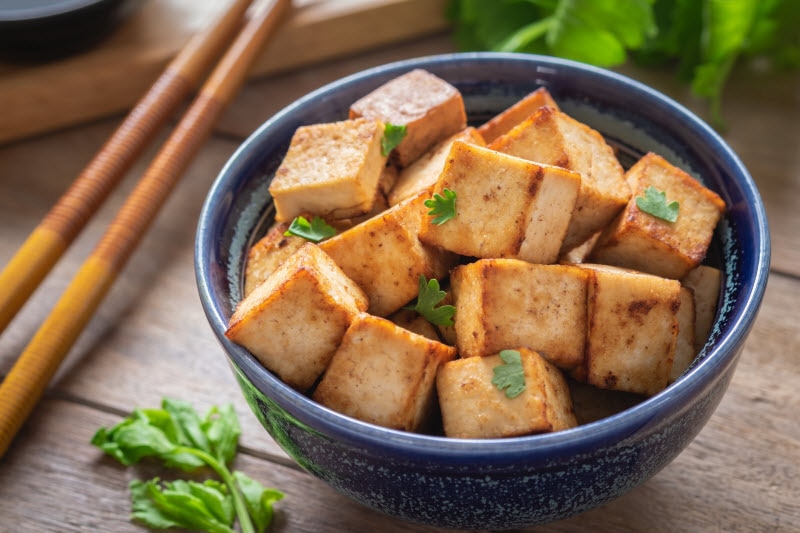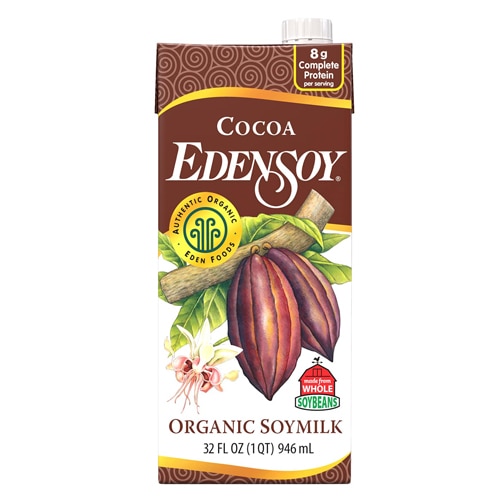[vc_row][vc_column][vc_column_text]It’s probably not a surprise to hear that the foods we eat impact our health. This includes heart health! The
American Heart Association recommends eating a diet rich in fruits in vegetables, whole grains, healthy proteins (such as legumes, nuts, fish/seafood and low- or non-fat dairy) and minimal consumption of processed foods, added sugars and alcohol to best support a healthy heart.
You may have heard that certain foods, like oatmeal and omega-3-rich fish, are particularly good for heart health.
Soy is another one we hear a lot about. Soy foods – like tofu, tempeh, soymilk and soy nuts – are, indeed a smart addition to a heart-healthy diet. Let’s take a closer like at what soy has to offer, especially in terms of cardiovascular wellness.

5 Soy Benefits for Heart Health
1. It's rich in isoflavones
Isoflavones are estrogen-like compounds produced by soy plants. Consumption of isoflavones has been associated with heart health benefits and reducing risk for heart disease. For example, a
study published in the journal Circulation in 2020 examined the diets of 200,00 people. Those who ate least one serving of tofu each week were found to have a reduced risk for heart disease by 18%, compared to those who did not (or rarely) ate tofu.
Foods high in isoflavones include: tofu, edamame, chickpeas, pistachios and peanuts. Although soymilk is a source of isoflavones, keep in mind that it’s often sweetened with added sugars, which may not result in the same heart health benefits (more research is needed).
2. It may reduce total and LDL cholesterol
Low-density lipoprotein (or LDL) cholesterol – also referred to as “bad cholesterol” – builds up on the walls of blood vessels, which can raise your chances of developing heart disease. Total cholesterol is a measurement of LDL and high-density lipoprotein (or HDL – “good cholesterol”), in your blood. By lowering your LDL cholesterol, you may be able to decrease your total cholesterol levels.
A
2000 meta-analysis of 38 clinical studies concluded that substituting soy proteins in place of animal proteins lowered total cholesterol, LDL cholesterol and triglyceride levels. When soy is consumed in place of high saturated fat products, cholesterol levels can decrease even more.
3. Supplies (good!) fatty acids
The fat found in soy foods is primarily monounsaturated and polyunsaturated. These types of fats are considered ‘healthy fats.’ In addition to healthy, unsaturated fats, soybeans provide omega-6 and omega-3 fatty acids. Omega-3 and omega-6 fatty acids also are known for supporting heart health!
Research has shown that
replacing foods high in saturated fat with foods rich in healthy, unsaturated fats can reduce your risk for heart disease.
4. It may lower blood pressure
A
2007 study in the journal Archives of Internal Medicine showed that 25 grams of soy protein (as soy nuts) per day in place of non-soy protein for 8 weeks lowered both systolic and diastolic blood pressure in both hypertensive women and normotensive postmenopausal women.
Additionally, a
2021 meta-analysis in the journal Complementary Therapies in Medicine showed “significant improvement in systolic blood pressure following soy consumption, in comparison to controls.” Authors noted that their “results suggest that soy intake is associated with an ameliorating effect on blood pressure in adults.”
5. It supplies high-quality protein
Depending on the type of soy products that you consume, soy can be a very good source of protein. According to the U.S. Department of Agriculture, ½ cup of tofu supplies 21.8 grams of protein, with 181 calories. Edamame, a type of soybean, supplies 18 grams of protein per cup. Miso supplies two grams of protein in just one tablespoon, and tempeh supplies 34 grams of protein per cup.
This makes tofu, tempeh, edamame and miso a suitable alternatives to animal-based protein options.
How much soy should you eat?
The amount of soy needed to decrease risk for heart disease varies. It’s generally recommended that we consume about three servings of soy-rich foods daily to equal the beneficial amounts in most studies. Decreasing animal protein foods (like red meat) and switching to plant-based proteins (including soy!) may help improve heart health even more.
It’s important to note that eating more soy foods may not completely prevent heart disease, but it can decrease your risk.
How to incorporate more soy foods into your diet
If you’re looking to increase your intake of soy, there’s no shortage of recipes on The Upside blog! Try a delicious
tofu scramble tostada for breakfast; blend up a
soymilk smoothie at snacktime; make
tempeh gyros for lunch; enjoy
tofu stuffed shells for dinner; and splurge on some
lemon-cream dessert parfaits (made with silken tofu!) for dessert.
Of course, you’ll find a great variety of soy foods and snacks on Vitacost.com, as well. Here are my top five favorites. I know you’ll agree – they’re
soy good!
- Mori-Nu Extra Firm Tofu
- Mori-Nu Silken Tofu Soft
- Bragg Liquid Aminos
- Seapoint Farms Edamame Dry Roasted Spicy Wasabi
- Seapoint Farms Dry Roasted Edamame Sea Salt
[/vc_column_text][/vc_column][/vc_row][vc_row][vc_column][vc_text_separator title="Featured Products" border_width="2"][vc_row_inner equal_height="yes" content_placement="middle" gap="35"][vc_column_inner width="1/3"][vc_single_image image="165567" img_size="full" alignment="center" onclick="custom_link" img_link_target="_blank" css=".vc_custom_1678991969333{padding-right: 7% !important;padding-left: 7% !important;}" link="https://www.vitacost.com/shiloh-farms-organic-yellow-soybeans-15-oz"][/vc_column_inner][vc_column_inner width="1/3"][vc_single_image image="165566" img_size="full" alignment="center" onclick="custom_link" img_link_target="_blank" css=".vc_custom_1678991984511{padding-right: 7% !important;padding-left: 7% !important;}" link="https://www.vitacost.com/koyo-tofu-miso-ramen"][/vc_column_inner][vc_column_inner width="1/3"][vc_single_image image="165565" img_size="full" alignment="center" onclick="custom_link" img_link_target="_blank" css=".vc_custom_1678992001761{padding-right: 7% !important;padding-left: 7% !important;}" link="https://www.vitacost.com/bobs-red-mill-soy-protein-powder"][/vc_column_inner][/vc_row_inner][/vc_column][/vc_row]




